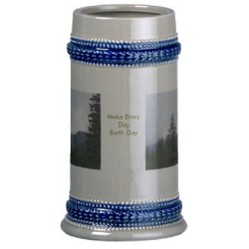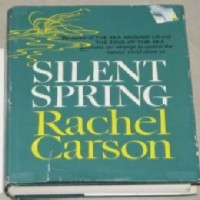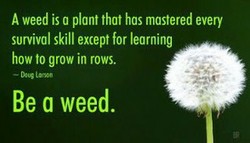If there is to ever be a response to environmental issues that will transcend generations, there must be an effort to educate children. Children might not understand the technical terms, but simple things like recycling can be an activity that includes them. Simple inclusion may not go far enough, there should also be dialogue as to why an activity is being performed, and what good can come of it. For young children, I would suggest avoiding scare tactics, but point out benefits without emphasizing consequences. Older children can be exposed to consequences, but this should be done so without suggesting a dire situation exists. Of course you can make it clear that there is a responsibility involved in helping the Earth.

Our Environment: Teaching Children Responsibility
Ecology is so important it must be addressed early when a child is still open to, and seeks, knowledge. The environment can be considered with age appropriate learnrning.
Start Environmental Education with Young Children
It Is a Good Time for Learning
Young children enjoy being read to, and once a child becomes acquainted with reading there is a desire to perfect this skill by reading alone. Children devour books, and if they are as I was as a child they will have limited books available, so reading them often is quite possible.
Books for very young readers are easily found. They should contain many pictures to reinforce the word meanings, and small, familiar words. If there are too many words a child does not understand there will be discouragement, and once discarded the book will be of little value. But, if there are a few new words that is fine as long as you are prepared to explain them. In fact, interaction with a parent may actually improve how engrossed the child will become.
Fortunately, many books on the environment are available for young readers. Some may concentrate on one issue of ecology, anther may focus on a different ecological issue. There are so many ecological issues of importance it is not likely one book will cover them all.
If an activity is suggested, and it is possible, the child likely will believe in the importance of the activity if it is done as a family. Showing agreement in an idea goes a long way. Equally, showing disdain for an idea does much harm.
Older Children
Fun Activities for Going Green
Older children might be interested in proactive activities. Allow the child to explore concepts like wind or solar power with age appropriate toys. The toy itself might not save energy, but it might instill the initial thoughts that windmills and solar power are valuable, an idea that can flourish later in life.
Of course progression to more age appropriate books is also a positive activity.
Children Are Impressionable
Children are impressionable, and ideas they develop can remain for life. But, a child might not really like school. Making the information available in a way that does not look like a lesson is being taught might find an eager learner, but if the child detects this is like school there might be a total shut down. Make the experience fun, and you should be rewarded with the material being accepted.
This article contains links to affiliate programs from some or all of Amazon, Viglink, and Ebay through Viglink, and Adsense advertising. These must use cookies to allow for proper crediting.
You might also like
If we could turn back timeProgress brings many problems it seems and many people would welcome going ba...
Weeds - beautiful rebelsAre dominating weeds in your garden harmful
Ecology of the Earth: Promoting AwarenessEcology, whether it is climate concerns, ozone depletion, clean air, clean wa...







 Multivariable Calculus: Gradient, Divergence, and Curlon 12/19/2025
Multivariable Calculus: Gradient, Divergence, and Curlon 12/19/2025
 UAPs, Formerly UFOs, If They Are Real How Can We Explain Their Arrival to Earth?on 12/18/2025
UAPs, Formerly UFOs, If They Are Real How Can We Explain Their Arrival to Earth?on 12/18/2025
 Polar Coordinate Systemon 12/16/2025
Polar Coordinate Systemon 12/16/2025
 Aurora Can Disrupt Electrical Devices And Even the Grid?on 12/15/2025
Aurora Can Disrupt Electrical Devices And Even the Grid?on 12/15/2025




Comments
Thanks for the comments.
A lovely article and I agree about starting children young with environmental issues.
When I was teaching, I used to involve my classes in every possible project locally that concerned the environment. One project was an " invisible " planting in the woodlands where the children planted acorns, horse chestnuts, all those natural things. It was a lovely thing to do. Then we did daffodil planting one time in the local park. The children were 5 years old and I hope these early environment experiences had an influence on them .
blackspanielgallery, Master naturalists say that the great ecologists and natural historians have diverse backgrounds, except for the commonality of spending lots of time outdoors with nature early on. It tends to be really rewarding fun to back that time outside up with early environmental education and sciences indoors through appropriate books, games, kits and toys.